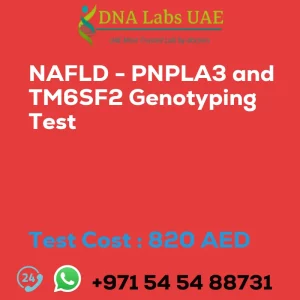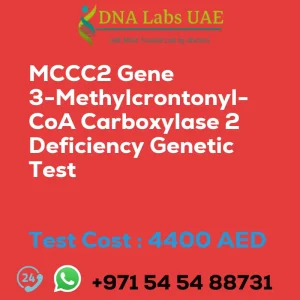GALACTOSEMIA PANEL 2 Test
Test Name: GALACTOSEMIA PANEL 2 Test
Components:
- Galactosemia Screening
- Galactosemia Classical (Transferase)
- Galactose Plasma
Price: 790.0 AED
Sample Condition:
- 4 mL (2 mL min.) whole blood from 1 Green Top (Sodium Heparin) tube
- 4 mL (2 mL min.) CONTROL blood from 1 Green Top (Sodium Heparin) tube
- 2 mL (1 mL min.) plasma from 1 Green Top (Sodium Heparin) tube
Ship refrigerated. DO NOT FREEZE. Avoid sample collection for 60 days post transfusion. Clinical and drug history must accompany sample.
Report Delivery: Sample Daily by 4 pm; Report 5 days
Method: Spot Test, Enzyme assay
Test type: Inborn errors of metabolism
Doctor: Pediatrician
Test Department: GENETIC
Pre Test Information: Avoid sample collection for 60 days post transfusion. Clinical and drug history must accompany sample.
Test Details
The Galactosemia Panel 2 Test is a diagnostic test used to detect mutations in the genes associated with galactosemia, a rare genetic disorder. Galactosemia is characterized by the body’s inability to break down galactose, a sugar found in milk and other dairy products.
The Galactosemia Panel 2 Test analyzes specific genes, including GALT, GALK1, and GALE, which are involved in the metabolism of galactose. Mutations in these genes can lead to a deficiency in enzymes necessary for galactose metabolism, resulting in the accumulation of galactose in the body.
The test is typically performed on individuals suspected of having galactosemia, especially newborns who may present with symptoms such as jaundice, vomiting, and failure to thrive. Early detection and diagnosis are crucial, as galactosemia can lead to severe complications if left untreated.
The Galactosemia Panel 2 Test is usually conducted using a blood sample. The sample is sent to a laboratory, where it undergoes genetic analysis to identify any mutations in the genes associated with galactosemia.
The results of the test can help healthcare providers determine the appropriate treatment and management plan for individuals with galactosemia.
It is important to note that the Galactosemia Panel 2 Test specifically analyzes the genes included in the panel and may not detect all possible mutations associated with galactosemia. Additional testing or consultation with a genetic specialist may be required for a comprehensive evaluation.
| Test Name | GALACTOSEMIA PANEL 2 Test |
|---|---|
| Components | *Galactosemia Screening*Galactosemia Classical (Transferase)*Galactose Plasma |
| Price | 790.0 AED |
| Sample Condition | 4 mL (2 mL min.) whole blood from 1 Green Top (Sodium Heparin) tube AND 4 mL (2 mL min.) CONTROL blood from 1 Green Top (Sodium Heparin) tube AND2 mL (1 mL min.) plasma from 1 Green Top (Sodium Heparin) tube. Ship refrigerated. DO NOT FREEZE. Avoid sample collection for 60 days post transfusion. Clinical and drug history must accompany sample. |
| Report Delivery | Sample Daily by 4 pm; Report 5 days |
| Method | Spot Test, Enzyme assay |
| Test type | Inborn errors of metabolism |
| Doctor | Pediatrician |
| Test Department: | GENETIC |
| Pre Test Information | Avoid sample collection for 60 days post transfusion. Clinical and drug history must accompany sample. |
| Test Details |
The Galactosemia Panel 2 Test is a diagnostic test used to detect mutations in the genes associated with galactosemia, a rare genetic disorder. Galactosemia is characterized by the body’s inability to break down galactose, a sugar found in milk and other dairy products. The Galactosemia Panel 2 Test analyzes specific genes, including GALT, GALK1, and GALE, which are involved in the metabolism of galactose. Mutations in these genes can lead to a deficiency in enzymes necessary for galactose metabolism, resulting in the accumulation of galactose in the body. The test is typically performed on individuals suspected of having galactosemia, especially newborns who may present with symptoms such as jaundice, vomiting, and failure to thrive. Early detection and diagnosis are crucial, as galactosemia can lead to severe complications if left untreated. The Galactosemia Panel 2 Test is usually conducted using a blood sample. The sample is sent to a laboratory, where it undergoes genetic analysis to identify any mutations in the genes associated with galactosemia. The results of the test can help healthcare providers determine the appropriate treatment and management plan for individuals with galactosemia. It is important to note that the Galactosemia Panel 2 Test specifically analyzes the genes included in the panel and may not detect all possible mutations associated with galactosemia. Additional testing or consultation with a genetic specialist may be required for a comprehensive evaluation. |







